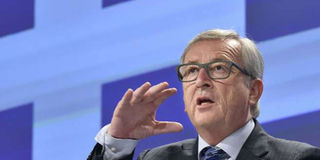EU imposes slaps sanctions on Nkurunziza aides, coup plotter

European Commission President Jean-Claude Juncker gives a press conference on Greece at the EU headquarters in Brussels on June 29, 2015. The EU has imposed an asset freeze and travel ban on three Burundi officials accused of ordering excessive use of force against peaceful protesters. PHOTO | JOHN THYS | AFP
What you need to know:
- President Nkurunziza’s decision to pursue a third term in office triggered street protests and the coup attempt, with opponents of the president saying the decision was unconstitutional.
- Belgium, Burundi’s former colonial power, has meanwhile said it will suspend aid for some development projects in the country because of the recent political instability.
BRUSSELS
The EU has imposed an asset freeze and travel ban on three Burundi officials accused of ordering excessive use of force against peaceful protesters.
The officials — overseeing intelligence and security bodies — are close to President Pierre Nkurunziza.
The EU also imposed sanctions on a former general who took part in a failed coup in May.
President Nkurunziza’s decision to pursue a third term in office triggered street protests and the coup attempt, with opponents of the president saying the decision was unconstitutional.
Following the failed coup in May, the president went to win an election.
Unrest continued in the central African country, with more than 100 people reported to have been killed over the summer.
VIOLENT REPRESSION
On Friday, the EU announced sanctions against Godefroid Bizimana, the deputy head of the national police, accused of decisions that led to the “disproportionate use of force and acts of violent repression” towards peaceful demonstrations.
Also slapped with sanctions was Gervais Ndirakobuca, a cabinet official responsible for police matters, who is accused of giving instructions that prompted violations of international human rights law.
The third official, Joseph Niyonzima, a senior intelligence official is accused of arming and training a pro-government militia.
The EU also imposed sanctions on Leonard Ngendakumana, a former general who took part in the coup, who is accused of “obstructing the search for a political solution”.
Belgium, Burundi’s former colonial power, has meanwhile said it will suspend aid for some development projects in the country because of the recent political instability.
DEAFENING GUNSHOTS
Foreign Minister Alain Nyamitwe told the BBC that the force used was justified because the protests were violent and had been preventing people from going about their daily business inEyewitness to Burundi killing: Prime Ndikumagenge, BBC Africa, Bujumbura.
However, the street violence continues. A resident on Friday described to the BBC an attack he witnessed.
“I have never before been so close to a violent attack. But on Friday morning, a colleague and I were having coffee in a restaurant when just a few metres away two people were gunned down,” he said.
“The gunshots were deafening, and it was like they were coming from all around — this did not sound like an ordinary pistol, but a high-calibre weapon.
Everyone in the restaurant got down on the floor. After a few minutes of silence we timidly ventured out and saw the macabre scene: Two bullet-riddled bodies. One victim was the owner of a local bureau de change, the other his employee.
“It may just have been a robbery, but it comes at a time of a lot of political killings,” he said.
Meanwhile, Burundi this week accused Rwanda of training rebels plotting to destabilise the country, charges Rwanda has denied.





